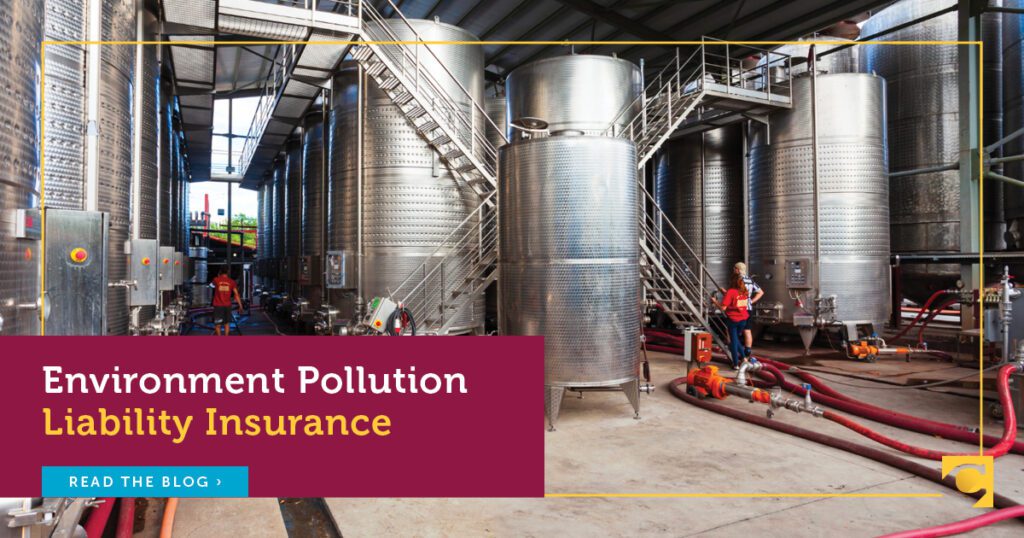Pollution Liability Insurance: Everything You Need to Know

While pollution incidents might not occur often, when they do, they’re often complex and costly. What’s more, your general liability insurance may not fully cover the specific characteristics of pollution risks.
That’s why pollution liability coverage is essential if you’re a contractor or own a business that could generate hazardous waste exposure. Here, we explore this crucial coverage option with Thomas McMillan, Commercial Lines Staff Underwriter at Central Insurance.
Understanding Pollution Liability Insurance
Generally, this type of insurance covers pollution-related claims against your organization. Environmental pollution liability insurance is a specialized form of coverage designed to protect businesses from the costly risks associated with hazardous waste incidents. These risks include the discharge of pollutants brought onto a worksite or the release of existing pollutants at the site, which can occur suddenly or gradually over time.
This insurance coverage provides financial protection and support to mitigate cleanup costs, legal fees, and damages resulting from pollution events. Environmental liability coverage falls into two main categories:
Third-Party Liability Coverage
This coverage provides protection for claims of bodily or personal damage or damage to property from pollution or contamination.
Example: Contractor Pollution Liability
Coverage for organizations that could cause pollution away from their owned, occupied, or leased property. Think of an excavation contractor who is visiting a third-party site and disrupts pollutants in the ground.
First Person Liability Coverage
This coverage provides the insured with funds to handle contamination from chemicals or hazardous wastes.
Example: Site Pollution Liability
Coverage for organizations that could have hazardous waste leakage at their owned property. Think of a gas station with the potential for gas tank leaks beneath the ground. Third-party coverage can come in if the hazard leaks to adjacent properties.
When it comes to preventative measures for your premises, McMillan recommends visiting the EPA or NETR website. Here, you can search addresses and reveal any prior pollutants at any location, giving you an indication of the land you’ll be working on.
Did you know: The Environmental Protection Agency defines pollution as “any substances in water, soil, or air that degrade the natural quality of the environment, offend the senses of sight, taste, or smell, or cause a health hazard.”
It is important to note certain pollutants may be excluded from these types of policies, commonly asbestos, lead, and mold. Thus, it’s crucial insureds understand their policies and consult with their agents to identify any gaps in their coverage.
Who Needs Pollution Liability Insurance?
Let’s dive deeper into what pollution liability coverage entails and who can benefit from it.
Contractors
Contractors are especially susceptible to pollution claims. Third-party coverage can assist in covering bodily harm, property damage, and cleanup if there’s a pollution incident at a construction site.
Get insights like this right in your inbox. Subscribe to the Central Blog below.
“Pollution often gets kicked to the back of the mind for contractors,” says McMillan, “but it can be millions of dollars of loss just like anything else.” Pollution events can be sudden or occur gradually over time, complicating claims further. Having the right coverage in place can help contractors remain profitable and secure.
Manufacturers and Construction Companies
General liability insurance and property insurance policies often exclude losses at the hands of pollution. Without environmental coverage, your business can face major costs out of pocket, which can manifest differently depending on your organization.
Manufacturing Businesses: If you’re working with liquids, gasses, or solids that could potentially pollute the property around your facility, you need site pollution liability insurance. This insurance covers property loss and harm to your employees on the site or anyone else affected by the hazards on the property.
Learn More: Protecting your manufacturing business with these manufacturing loss control tips from Central.
Construction Companies: If there are accidental spills of construction materials such as concrete, oils, or chemicals on job sites, they can lead to environmental contamination. This insurance covers cleanup and remediation costs, including soil and water testing, removal of pollutants, and restoration of affected areas.
Learn More: Protecting your construction company with these construction loss control tips from Central.
Environmental Concerns
Due to increased awareness of the effects of pollutants, environmental concerns are growing. Exposures that may have gone under the radar in the past are now getting increased attention. Accidental polluters can expect more fines, penalties, and claims against them.
“Claims can happen through a few different methods,” McMillan explains. “Often, the general liability provider is put on notice, and the pollution coverage will be written alongside that. Sometimes the insured themselves let their agent know there was an incident, while other times another contractor or a property owner can file a claim against the insured.”
Expert Coverage with Central
By securing pollution liability coverage, companies and contractors alike can protect themselves from costly environmental claims and regulatory penalties. It is essential to work closely with knowledgeable insurance agents who can assess your specific needs and guide you through finding the right coverage.
Don’t wait until it’s too late—reach out to your Central agent today to safeguard your business against pollution claims.
The information above is of a general nature and your policy and coverages provided may differ from the examples provided. Please read your policy in its entirety to determine your actual coverage available.
Like this:
Loading…



